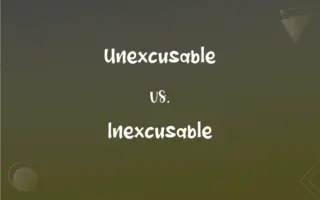Conceed vs. Concede: Mastering the Correct Spelling
Edited by Aimie Carlson || By Janet White || Updated on March 9, 2024
"Conceed" is an incorrect spelling, whereas "concede" is correct. "Concede" means to admit that something is true or valid after first denying or resisting it.

Which is correct: Conceed or Concede
How to spell Concede?

Conceed is Incorrect

Concede is Correct
ADVERTISEMENT
Key Differences
Remember, "concede" has only one 'c' after the 'on'.
Associate "concede" with "proceed," which has a similar spelling.
"Concede" rhymes with words like "need," which also have a single 'e' before the 'd'.
"Concede" follows the common English pattern of 'e' before 'd'.
Visualize the word "concede" in a sentence to remember its correct form.
ADVERTISEMENT
Correct usage of Concede
It's hard for him to conceed that he might not be the best choice for the job.
It's hard for him to concede that he might not be the best choice for the job.
The politician had to conceed the election after the final votes were counted.
The politician had to concede the election after the final votes were counted.
He refused to conceed the argument even though he was wrong.
He refused to concede the argument even though he was wrong.
She would rather argue than conceed she made a mistake.
She would rather argue than concede she made a mistake.
The team was not ready to conceed defeat in the championship game.
The team was not ready to concede defeat in the championship game.
Concede Definitions
Concede can mean to grant or yield something as a right.
The company conceded some benefits to its employees.
Concede involves reluctantly acknowledging something to be true or valid.
She conceded that she had made a mistake.
Concede is used to admit a point in argument, often grudgingly.
He conceded that her point was valid.
In historical or diplomatic contexts, concede means to yield territory or position.
The treaty conceded the disputed lands to the neighboring country.
Concede means to admit that one has lost or been mistaken in a dispute.
The politician conceded the election after a close vote.
To acknowledge, often reluctantly, as being true, just, or proper; admit
Conceded that we made a mistake.
To acknowledge or admit (defeat).
Concede Sentences
It's difficult for many people to concede their errors.
In chess, it's common to concede the game when loss is inevitable.
The company had to concede that there were flaws in their product.
I concede that your plan might be the better option.
It's a sign of maturity to concede when you're wrong.
Sometimes it's wise to concede to avoid a greater loss.
To concede the goal in the last minute was devastating for the team.
In negotiations, both sides often have to concede something.
Concede Idioms & Phrases
Concede defeat
To admit that one has lost a competition or argument.
After the final vote count, the candidate conceded defeat graciously.
Concede nothing
To not give in or admit any fault or defeat.
Despite the overwhelming evidence, he chose to concede nothing.
Concede the point
To acknowledge that someone else's argument or part of it is correct.
Although it was hard, he had to concede the point during the debate.
Concede before the battle
To give up before even trying, assuming defeat ahead of time.
You shouldn't concede before the battle; there's always a chance of success.
Privately concede
To admit something to oneself or in a non-public manner.
Although she would never say it out loud, she privately conceded that she was wrong.
Concede ground
To give up a position or advantage in a debate or competition.
The team refused to concede ground, fighting until the last whistle.
Graciously concede
To admit defeat or acknowledge an error politely and with good manners.
He graciously conceded the argument, acknowledging the other person's superior knowledge on the topic.
Concede an argument
To admit that one's argument is weaker or incorrect.
It takes courage to concede an argument when you realize your facts are wrong.
Ready to concede
Being prepared to admit loss or error as soon as it becomes apparent.
He was ready to concede as soon as the new evidence was presented.
Concede to
To surrender or yield to someone else's opinion, demand, or point of view.
The company finally conceded to the workers' demands for better wages.
Never concede defeat
A motivational phrase encouraging perseverance and not giving up.
His motto was to never concede defeat, no matter how difficult the situation seemed.
Concede a point gracefully
To admit that one is wrong in a particular aspect of an argument without losing dignity.
She conceded the point gracefully, winning respect from her peers.
Concede from a position of strength
To make concessions from a situation where one still holds some advantage.
Negotiating from a position of strength, she was able to concede minor points while achieving her main goals.
Concede with reservations
To admit something hesitantly or with reluctance.
She conceded with reservations, still unsure about the new policy's implications.
Concede under pressure
To give in due to external force or persuasion.
The politician conceded under pressure from his party to step down.
Concede that
A way to introduce an admission or acknowledgment within a conversation.
I have to concede that your analysis on the issue is more comprehensive than mine.
Concede for the sake of peace
To give in or agree to something to maintain harmony or avoid conflict.
Sometimes, it's wise to concede for the sake of peace within the family.
Concede with dignity
To accept defeat or admit a mistake in a manner that preserves one's respect.
Losing the game, the team captain conceded with dignity, congratulating the winners.
Concede the field
To acknowledge defeat and withdraw from competition.
After a valiant effort, the challenger had to concede the field to the reigning champion.
Publicly concede
To admit something openly in front of others.
The mayor publicly conceded that the city's response to the crisis could have been better.
FAQs
What is the root word of concede?
The root is from Latin "concedere."
What is the verb form of concede?
Concede is itself a verb.
What is the plural form of concede?
As a verb, "concede" does not have a plural form.
Why is it called concede?
It's called "concede" from Latin "concedere," meaning to yield or give way.
Which vowel is used before concede?
The vowel 'o' is used before "concede."
What is the singular form of concede?
As a verb, "concede" remains the same in singular form.
Is concede a noun or adjective?
Concede is a verb.
What is the pronunciation of concede?
Concede is pronounced as /kənˈsiːd/.
Is concede an adverb?
No, "concede" is not an adverb.
Which conjunction is used with concede?
Conjunctions like "and" and "but" can be used, depending on context.
Which article is used with concede?
As a verb, "concede" typically does not use an article.
Is concede a vowel or consonant?
"Concede" is a word; it contains both vowels and consonants.
Is concede a countable noun?
Concede is not a noun; it's a verb.
What is a stressed syllable in concede?
The stressed syllable in "concede" is the second: cede.
What part of speech is concede?
Concede is a verb.
Which preposition is used with concede?
Prepositions like "to" and "that" are commonly used with "concede."
Is concede an abstract noun?
No, "concede" is a verb, not a noun.
Is the concede term a metaphor?
"Concede" can be used metaphorically but is not inherently a metaphor.
How do we divide concede into syllables?
"Concede" is divided as con-cede.
What is the third form of concede?
The third form is "conceded."
Is concede a collective noun?
No, "concede" is not a collective noun.
What is the opposite of concede?
The opposite of "concede" is "deny" or "dispute."
Is concede a negative or positive word?
Concede is neutral but can have negative connotations of reluctance or defeat.
Is the word concede imperative?
"Concede" can be used in the imperative form.
How many syllables are in concede?
There are two syllables in "concede."
What is another term for concede?
Another term for "concede" is "admit."
Which determiner is used with concede?
As a verb, "concede" typically does not use a determiner.
What is the first form of concede?
The first form is "concede."
What is the second form of concede?
The second form is "conceded."
How is concede used in a sentence?
Example: "After a long debate, he finally conceded that her approach was more effective."
About Author
Written by
Janet WhiteJanet White has been an esteemed writer and blogger for Difference Wiki. Holding a Master's degree in Science and Medical Journalism from the prestigious Boston University, she has consistently demonstrated her expertise and passion for her field. When she's not immersed in her work, Janet relishes her time exercising, delving into a good book, and cherishing moments with friends and family.
Edited by
Aimie CarlsonAimie Carlson, holding a master's degree in English literature, is a fervent English language enthusiast. She lends her writing talents to Difference Wiki, a prominent website that specializes in comparisons, offering readers insightful analyses that both captivate and inform.


































































